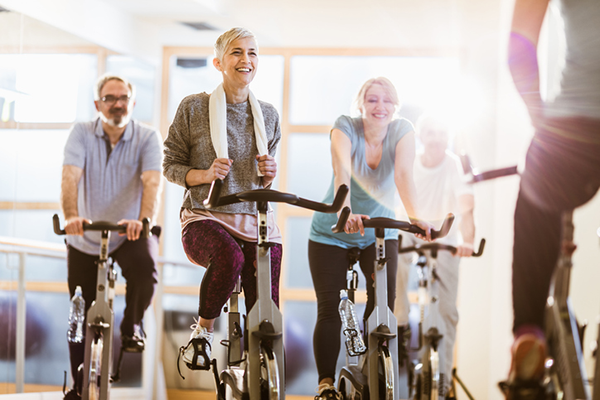Fitness can lead to happiness because it positively influences our physical and psychological health and well-being. To learn more about how this happens, read the post by Linnea Zielinski in The BODi Blog.

You’ve probably heard of the “runner’s high,” that feeling of euphoria some people get after a run. You might even know about endorphins, the feel-good hormones responsible for post-sweat happiness and satisfaction. But these examples only scratch the surface of how fitness can lead to happiness.
Being active is deeply connected with being happy. Even though we tend to associate physical activity with physical benefits like increased strength and weight loss, what’s happening to our physical bodies when we move them is only part of the picture.
Regular physical activity kicks off a chain of positive effects, from helping you feel calm under pressure to boosting your self-confidence. Keep reading to find out how exactly your workouts can boost your mood.
How Fitness Leads to Happiness
Fitness positively influences our physical and psychological health. A 2020 study of 2,345 healthy adults of all ages found that people who moved more reported feeling more satisfied with their lives, compared with those who didn’t get as much activity.
Here’s how physical movement ripples out into our emotional and mental well-being over the short and long term.
Short-term benefits of exercise
While you’re exercising, endorphins and feel-good neurotransmitters like serotonin flood your body, says Carla Marie Manly, Ph.D., a clinical psychologist and certified yoga instructor.
In 2016, researchers at University of California, Davis used imaging to watch how vigorous workouts positively changed participants’ brains. They found that exercise replenishes our stores of feel-good neurotransmitters responsible for connecting our emotional and physical health.
Beyond boosting our feel-good chemicals, exercise can also “flip a switch” in our nervous system. Research from 2014 found that stretching, for example, shifts the body into “parasympathetic dominance” (aka our rest and digest state).
A solid workout might even help you focus when you return to your desk afterward, which is a lesser-known benefit of exercise. (And who isn’t happier when they’re not distracted and procrastinating?)
Long-term benefits of exercise
Physical fitness can also lead to happiness well after the endorphins have worn off. That’s because activity increases your wellbeing in lasting ways.
Incorporating fitness into your lifestyle can lead to “a sense of accomplishment for sticking to a healthy exercise routine,” says Manly. If your form of activity involves workout buddies, that support can also encourage happiness.
Work out consistently, and you’ll reap “increased feelings of self-worth,” says Manly. Feeling your strength and endurance grow can boost your self-esteem and make you feel more competent. Changing your physique through fitness can make you feel more attractive and confident, she adds.
All of those can contribute to the happiness you feel daily — as well as gratitude. (And if you’re wondering how to be happy, cultivating gratitude is a huge step in the right direction.)
How to Increase Happiness from Exercise
Simply being active encourages happiness, but these hacks can amplify the effects.
- Take your workout into nature, since there are also mental health benefits of being outside.
- See movement as a privilege — something you get to do, not something you have to do. “When you reframe your activity into a gift rather than a chore, you’re far more likely to experience more lasting joy,” explains Manly.
- Try to create some buffer time between being active and returning to the rest of your day. “You can maximize the mood-boosting benefits of exercise by taking time post-activity to really soak up the positive effects of the experience,” Manly says. That’s another reason not to skip your cool down!
- Beginners may face a learning curve — but significant benefits await at the finish line. “Focus on starting at a level that feels sustainable and healthy,” advises Manly, and remind yourself of why you started in the first place.





